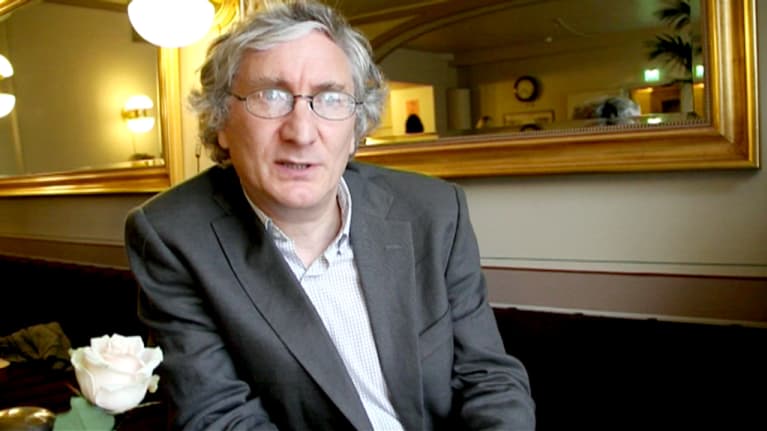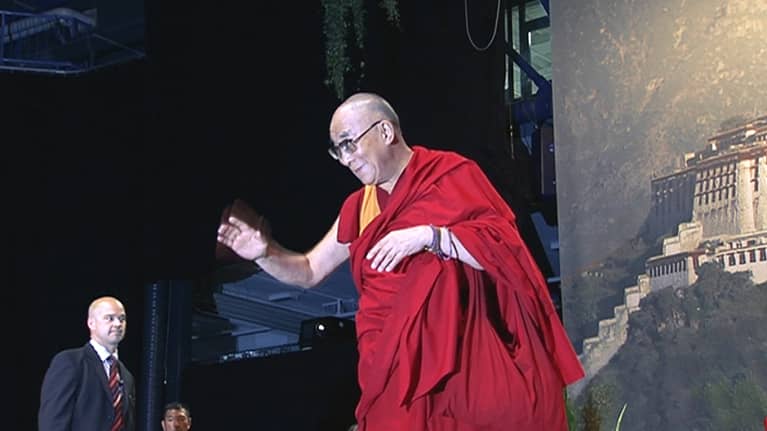The 76-year-old Nobel laureate’s fifth visit to Finland came to its climax on Saturday, August 20, with his public talks in Espoo, where he drew an audience in excess of 8,500 at a sold-out Barona Arena.
During his three-day visit to Finland, the Buddhist leader spoke about the importance of compassion as well as harmony between different religious traditions, which he often cites as the two concerns closest to his heart. At the same time, the Dalai Lama managed to bring the issue of Tibet to masses drawn to his universal message and warm, humorous style of teaching.
Historical timing of the visit
Since the 17th century, the Dalai Lamas have been both the spiritual and political leaders of Tibet. With the threat of Chinese communist take-over, the fourteenth Dalai Lama, Tenzing Gyatso, was forced to step into power when he was only 15. As China occupied Tibet, Tenzing Gyatso escaped to India in 1959.
Along with tens of thousands of Tibetan refugees that followed him, the Dalai Lama has remained in exile ever since. The refugee community is headquartered in the Northern Indian town of Dharamsala, where the Dalai Lama has led the Tibetan government in exile.
The Finnish visit came at a historical time, only weeks after the Dalai Lama officially ended the 400-year-old institution of the Dalai Lama as Tibet’s political head.
Known for his strong modernising tendencies, the religious leader said at the Helsinki press conference that as the Dalai Lama, he felt he had some say in the matter of the Dalai Lama institution. The political system was inaugurated by the fifth Dalai Lama, so now it was brought to a close by the fourteenth.
Tenzing Gyatso had been asking to hand over his political power to democratically elected representatives of the Tibetan exiles for years. However, due to the Tibetan community's devotion and respect for the Dalai Lama, his wishes to devolve power met with resistance among the very people he was trying to hand his power to.
In March 2011, the Dalai Lama announced his final decision to retire from political leadership and gave his political responsibilities to Dr. Lobsang Sangay, the newly elected Prime Minister of the exile government. The Dalai Lama would, however, remain the spiritual leader of Tibet, and continue to serve the cause of Tibet.
Daunting challenges
Sangay faces a daunting task. Chinese population transfers to Tibet, an educational system emphasising Chinese at the expense of the Tibetan language, and massive modernisation in general is quickly transforming the region, which is roughly the size of western Europe.
While China maintains that it is lifting the remote region out of poverty and bringing its people the benefits of modern development, the Dalai Lama and many Tibet supporters have been concerned about what they see as the sinofication of Tibet, the destruction of its traditional culture as well as persistent human rights violations against those who express discontent with the Chinese administration.
The Dalai Lama and the government-in-exile have long since renounced any claims for Tibetan independence, instead seeking a meaningful autonomy within the People’s Republic. Although negotiations have been held between exile officials and the Chinese government, these have led to few concrete results, with both sides blaming the other for inflexibility and inability to compromise.
The Chinese see the Dalai Lama’s claims for autonomy as fake political manoeuvring, where the long-term aim is full independence and splitting Tibet from the motherland.
Finland’s timid leadership
Perhaps the most successful refugee leader in recent history, the Dalai Lama has managed to attract huge international attention and sympathy towards his cause. His commitment to a non-violent resolution to the Tibet issue even earned him the Nobel Peace Prize in 1989. Yet his popularity among the public has failed to translate into real political support, as western countries have been wary of upsetting China and endangering increasingly important economic ties with the growing world power.
Tuula Saarikoski of the Finnish Tibetan Cultural Association, one of the organisers of the Dalai Lama’s visit, said they tried to arrange meetings with Finland’s President and Minister for Foreign Affairs, but were turned down. In Saarikoski’s estimation, such top leadership avoided a meeting with the Dalai Lama in order not to risk damaging Finland’s relations with China.
Though unvoiced by the above leaders, the current Minister of Finance Jutta Urpilainen explicitly articulated such concerns in an election panel organised by the newspaper Helsingin Sanomat during last spring’s parliamentary elections. Asked whether she would meet the Dalai Lama, Urpilainen replied that she would not, the reason being Finland’s important economic ties with China.
Such caution towards Beijing’s sensibilities stand in stark contrast to the independence evidenced by Finland’s small Baltic neighbour Estonia, where President Toomas Hendrik Ilves and other top leaders openly met with the Dalai Lama prior to his visit to Finland.
Professor: China is playing a diplomatic game
In Helsinki, the Dalai Lama met unofficially with about 20 Members of Parliament. Representatives of all political parties except for the Christian Democrats turned out to meet the spiritual leader, who has made inter-religious dialogue and harmony between different religions one of his most emphatic points.
Of more prominent political figures, only Minister for International Development Heidi Hautala and fellow Green-Party member, presidential candidate Pekka Haavisto met with the Dalai Lama. Both attended the seminar “Non-Violent Conflict Resolution: The Case of Tibet” at the University of Helsinki, where the Dalai Lama was the keynote speaker.
One of the panellists, Professor Robert Barnett, Director of Modern Tibetan Studies at New York’s Columbia University, has noticed how primitive western European countries seem to be when it comes to diplomacy with China:
“China uses the Dalai Lama as an opportunity to pretend to be very angry when he meets a western leader, in order to get a concession out of the western leader in return, as a kind of apology. They’ve been so successful with this…because diplomats are frightened by the rhetoric that China is upset.”
Barnett notes that former communist eastern bloc countries — such as Estonia — are more used to and therefore not so easily intimidated by these tactics.
"A certain robustness"
According to Barnett, the U.S. has also showed some strength in calling China’s diplomatic bluff.
"Obama had a meeting with the Dalai Lama in July, and the Chinese complained furiously. They called in the chargé d'affaires of the American embassy in Beijing and complained, but actually they did nothing. No punishment followed to the Americans whatsoever," Barnett notes.

In light of such observations, politicians might reconsider their stance on meeting the Dalai Lama if he makes it to this part of the world again. A man who draws crowds of nearly 10,000 as well as extensive media coverage is hardly insignificant to political leaders. In Barnett’s words, the Dalai Lama has immense “soft power that every western politician or president would die to have".
"The European people need to work out their China policy, because if you don’t show a certain robustness, then you lose the diplomatic game," Barnett continues. "And the Dalai Lama is a very good opportunity for westerners to work out a way of relating to China, because he’s not a violent person and he’s not supporting independence. So they have an opportunity here to say, we’ll meet him and we’re not really worried about what China might do. China doesn’t really seem to do so much, if it’s pushed on that issue, because it does not want to lose the friendship of these countries. It needs Finland, and needs other countries’ trade as well.”
